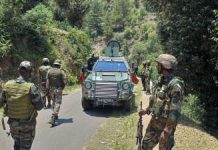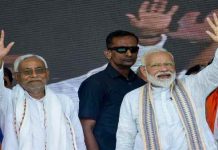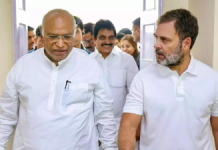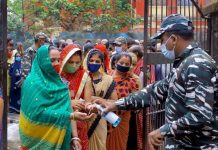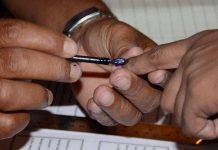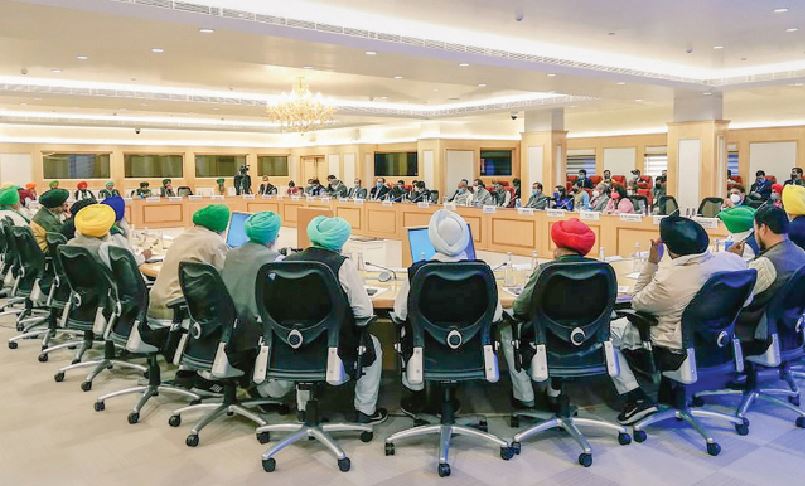
Fresh round of showdown between the farmers and the Centre is likely in coming days as the agitation against the three controversial agriculture laws complete seven months on June 26, reports AMIT AGNIHOTRI
The stage is set for another round of showdown between the farmers, who are pressing for repeal of three controversial agriculture laws, and the Centre, which has rejected their demand, as the agitation completes seven months on June 26.
However, protests had started from August 9, 2020 itself when the Farm Bills were made public and it was after the passage of the acts that more farmers and farm unions across India joined the protests. However, when the Indian Agriculture Acts of 2020 referred to three Acts that were approved by Lok Sabha on September 17 and Rajya Sabha on September 20 that agitation gained further momentum. On 25 September 2020 farm unions all over India called for a Bharat Bandh to protest against these farm laws and its effect was visible across the country and more particularly in Punjab, Haryana, Uttar Pradesh, Karnataka, Tamil Nadu, Odisha and Kerala. After the President of India gave his assent on September 27,2020 that agitating farmers from different states marched to Delhi to protest against the laws and the protests continued with much gusto and conviction.
The farmers will now stage dharna outside Governor Houses in states and submit a memorandum to President Ram Nath Kovind to mark the day.
“We will protest by showing black flags at Raj Bhavans and giving a memorandum to the President through the Governor of each state, who is the President’s representative,” Inderjit Singh of the Samyukta Kisan Morcha, an umbrella organisation of over 40 farmer unions, said.
“We will complete seven months of our protest on June 26 at a time when along with farming, democratic rights of people have also been attacked. This is an undeclared emergency. The day will be observed as “Kheti Bachao, Loktantra Bachao Diwas (Save farming, save democracy),” he said.
Bharatiya Kisan Union leader Rakesh Tikait too gave an ultimatum to the Centre and urged the farmers to prepare for another tractor rally like the one staged in Delhi on the Republic Day. “This government is not going to agree. It needs treatment. Get ready with your tractors, we will have to intensify the movement to save our lands,” Tikait tweeted.
The warning came a day after the farmer leader cautioned the government that the agitation would continue and the protesting peasants would not go back home.
“Either the farmers and the public will remain, or this government. The voices of farmers can’t be subdued with false cases,” Tikait said.He was referring to the allegations of the Delhi Police which said that several protesters had assaulted two Special Branch officers who had gone to the Singhu border to assess the ground situation.
Later, an FIR against unknown protestors had been lodged at the Narela police station. Tikait countered the charges by saying the police wanted to instigate the farmers.
Thousands of farmers, who have been protesting at the borders of Delhi since November 26, 2020, are adamant on a repeal of the three controversial agriculture laws while the Centre has once again offered to talk but only for changing some sections of the legislations.
“The Government of India is ready for talks with the farmers. Except for repeal, if any farmer union wants to talk on provisions of the Act even at midnight, Narendra Singh Tomar will welcome it,” the Union agriculture minister tweeted.
Past negotiations failed
Besides Union Agriculture Minister Narendra Singh Tomar, Food Minister Piyush Goyal had held 11 rounds of talks with the protesting farmer unions but there was no positive outcome.
The last such talks were held on January 22 when 41 farmer groups rejected the Centre’s proposal of putting the three laws under suspension. The dialogue broke down after the January 26 tractor rally which was marred by violence.
On January 11, the Supreme Court stayed the implementation of the three laws till further orders and appointed a four-member expert panel to talk to the farmers and find a solution.
Bhartiya Kisan Union President Bhupinder Singh Mann had recused himself from the committee. Shetkari Sanghathan (Maharashtra) President Anil Ghanwat and agriculture economists Pramod Kumar Joshi and Ashok Gulati were the other members on the panel, which has completed the consultation process with the stakeholders.
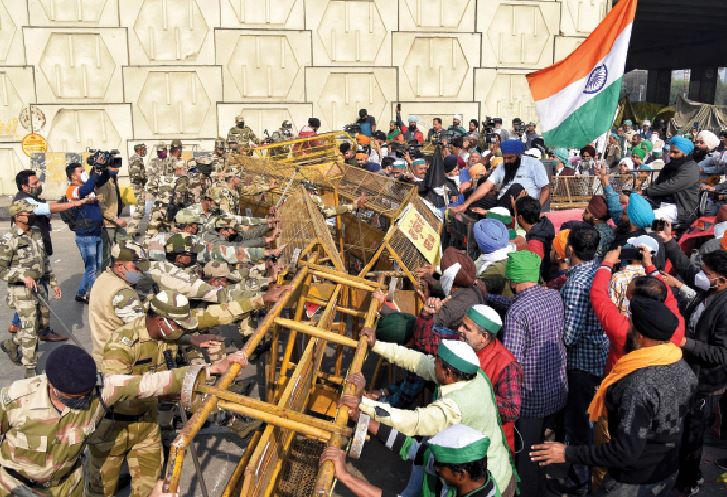
R-Day Tractor rally
Chaos had peaked on January 26 when farmers in over 20 tractors had entered the Red Fort’s forecourt, climbed its ramparts and hoisted their religious flag as policemen deployed there watched helplessly.
The Prime Minister addresses the nation every year on Independence Day from the ramparts of the Red Fort. The visuals aired on TV news channels did upset many supporters of the farmers though the peasants said they only wanted to send a message to the government.
Earlier, police and aggressive farmers clashed at several places including the Singhu border, Mukarba Chowk, ITO, Akshardham and Nangloi forcing the security personnel to resort to lathi charge and lob teargas shells to disperse the crowd. Many farmers were seen pelting stones at the police at ITO where two persons were spotted driving the tractors at high speed to scare the security deployment.
One farmer died when a tractor overturned while moving towards old Delhi, while several peasants and over 80 police personnel were reportedly injured during the clashes.
The joint front of farmers, which had assured the police that the tractor rally would remain peaceful, later distanced itself from the violent protesters and clarified that unsocial elements had infiltrated its ranks to give a bad name to the peaceful protest.
The violence by farmers had invited criticism from the opposition parties who slammed the Centre for not fulfilling its responsibility.
Protests continue
Thousands of farmers, including women, from Punjab, Haryana and western Uttar Pradesh, have been camping at Delhi’s borders since November last demanding a repeal of the three central laws.
While the farmers dub the laws as anti-poor and pro-corporate, the Centre says they are aimed at reforming the agriculture sector.
Besides the three laws, a law to guarantee MSP that the government pays to the farmers for various crops is also being demanded. The farmers say that the new laws would allow for setting up of private mandis and will end state procurement of crops.
As per the MSP system, the government purchases food grains, mainly wheat and rice besides some other crops, on a minimum support price fixed by the Commission for Agricultural Costs and Prices.
Over the past decades, most of the wheat and rice purchased at MSP has taken place in the government owned mandis or the Agriculture Produce Marketing Committees in Punjab and Haryana.
This brought prosperity among the farmers in the two northern states who fear that the new laws will bring in private players and reduce government purchase on MSP, impacting their income.
After the January 26 tractor rally, the movement had suffered a setback as some farmer groups had withdrawn from the agitation over the violence but Tikait and others went ahead to organise Kisan Mahapanchayats in neighbouring Haryana and western Uttar Pradesh.
Tikait had even campaigned against the Centre in the West Bengal assembly polls and later met Chief Minister Mamata Banerjee, who promised to support and expand the protests. Of late, farmers have staged massive protests across Punjab over the issue.
Responding to a call by the All India Kisan Khet Mazdoor Sangathan (AIKKMS), protests were recently held by farmers in many states demanding the repeal of three central farm acts.
These protests were held in villages of Haryana, Assam (South Salmara, Mankachar, Goalpara, Lakhimpur), Odisha (Puri, Jajpur, Angul, Koraput and Sambalpur), Karnataka, Chhattisgarh and Bihar (Munger, Madhepura, Muzaffarpur, Banka and Aurangabad), said a statement from SKM.
Farmers continue to hold local protests to get fair and remunerative price for their agricultural produce in states. While jowar farmers in Telangana were recently in the news, milk producers in Maharashtra too have also announced their agitation, said the SKM.
The Joint Platform of Central Trade Unions as well as other trade unions representing millions of workers too have supported the cause, said the SKM, adding that lakhs of workers participated in the May 26 action call all over the country.
Further, 10 Central Trade Unions have extended their support to the call of “Save Agriculture, Save Democracy” day to be observed across the country on June 26, said the SKM as it declared solidarity with the ongoing struggle of the workers for the repeal of four Labour Codes and against privatisation of the public sector.
More protestors are reaching different morchas at Delhi’s borders. A large contingent of farmers led by BKU Tikait started from Bulandshahr for the Gazipur border of Delhi covering more than 90 km by foot.
Thousands of teachers led by Democratic Teachers’ Front of Punjab too reached the Tikri Border of Delhi. At more than 100 locations in Punjab, protests have been continuing since November last, the farmers claimed.
The Punjab and Haryana High Court recently observed that farmers’ agitation across the country against the farm laws had thrown up an extraordinary situation, especially in Punjab and directed the state government to set up a panel to resolve the issue of free movement of grains.
Around 8,000 MT grains have been stored at the Ferozepur facility of private player Adani, which had petitioned the court.
BJP leaders face protests.
The protesting farmers have been opposing the public functions of the BJP-JJP leaders in Haryana over the farm laws.
A group of farmers held a protest hours before Haryana Chief Minister Manohar Lal Khattar attended an event in Panchkula near Chandigarh with police taking some of the protesters into preventive custody.
Farmers waved black flags when BJP leader Babita Phogat was attending an event related to the International Yoga Day celebrations in Charkhi Dadri, near Delhi.
Phogat had joined the BJP in 2019, but lost her first election. She was later appointed as chairperson of Haryana Women Development Corporation by the BJP-JJP government.
Concerned over the developments, some farm leaders later decided “the social boycott and agitations against the leaders of BJP and its allies will be in the context of their official programmes, including government and political, and not for their personal or private events, like weddings and participation in funeral processions”.
“All resistance will be completely peaceful, through the use of black flags or slogans, and will not involve any violence or use of force,” the Sanyukta Kisan Morcha declared in a statement.
Yogendra Yadav, one of the nine members of the SKM, said, “Our real fight is in Delhi, against the Central government. We don’t need to get entangled with small governments time and again. Our opposition against the MLAs, MPs, and other representatives of the BJP and its allies will continue in Haryana and other states. But this opposition will be only for government and political functions, not for private events.”
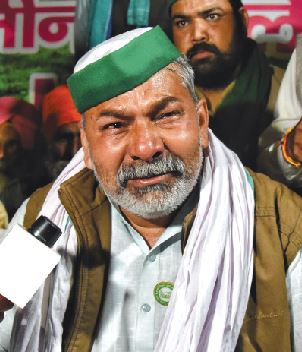
Counter protests
People from around 20 villages held a “mahapanchayat” in Sonepat, near Delhi, demanding that protesting farmers open a side of the road connecting their area to the Singhu border.
“People who need to travel for their jobs are facing a lot of problems. Students who go for their tuition and coaching classes are also hit. The industrial units and several shops are facing heavy losses. We have no issue with farmers, we are not against them but as citizens, we too have equal rights,” Ramphal Saroha, who presided over the event, said.
“The entire road has been blocked by protesters for the past seven months. We are demanding that one side of it should be cleared as people in the area are facing a lot of difficulties,” he said.
However, the Samyukt Kisan Morcha claimed that local support has been abundantly available for the ongoing movement. Showcasing such support, at least 10 trolleys of wheat were sent by villagers in and around Kharkonda recently for the free community kitchen service at the Singhu border.
This support was mobilised with the help of Rashtriya Kisan Maha Sangh, said the SKM, adding that more than 40 trolleys of wheat came from villages in and around Sonepat, mobilised with the help of BKU-Chaduni.
How the movement started?
The farmers’ demand for withdrawal of the three new agriculture laws is not new and had been first raised in September 2020 when the Centre rushed through the legislations during the Monsoon Session of Parliament.
Before that the farmers had raised the red flag when the Centre had issued three new ordinances for the same during the lockdown saying the executive orders were needed to boost the agriculture sector.
But the farmers did not buy the government’s argument and came out in large numbers across the country, mainly in the northern states of Punjab and Haryana. The farmers were pacified for a while in September when Punjab Chief Minister Amarinder Singh passed three separate state laws to negate the central laws. But the state laws could not be approved by President of India Ram Nath Kovind, as mandated by the Constitution, as the files remained stuck with Punjab Governor VP Singh Badnore.
The protests revived in October as the agitated farmers blocked roads and railway tracks in Punjab to put pressure on the central government. Alarmed at the development, the Centre stopped movement of passenger and freight trains in Punjab citing security concerns. This resulted in shortage of raw materials like coal for power plants and fertilizer for the wheat crop in Punjab and induced losses to the state exchequer forcing the Amarinder Singh government to buy electricity from the national grid.
The Punjab CM staged a protest in the national capital but to no avail. As the Centre remained unresponsive to their demand, the various farmer groups decided to take their protest to Delhi for a final resolution towards the end of November.
As thousands of farmer groups from Punjab and Haryana marched through Haryana to reach the national capital towards November end 2020, they had to face police brutality in the state and later braved water cannons in cold winter mornings at north Delhi’s Singhu border.
At first the Centre tried to discourage the farmers by denying them entry in Delhi, but later relented when many of them faced a lathi-charge as they broke police barriers to enter the city.
Farmer groups from western Uttar Pradesh and Uttarakhand too reached Delhi’s borders in Ghaziabad and Noida to join the protest, while demonstrations were held in other states like Maharashtra, Madhya Pradesh, Tamil Nadu and Kerala.
Realizing there was no escaping the determined farmers, the Centre invited them for talks. Prime Minister Narendra Modi had backed the farm laws indicating the Centre was in no mood to repeal the legislations.
Political support
Though the farmer agitation has remained apolitical, it has been supported by almost all the opposition parties namely Congress, Trinamool Congress, the Left Parties, Nationalist Congress Party, Shiv Sena, Rashtriya Janata Dal among others who have charged the government with ignoring the plight of the food growers.
The Shiromani Akali Dal, which parted ways with the BJP over the three farm laws, blamed the Centre for neglecting the protesters. The protests which generated huge sympathy for the farmers across the country have registered around 477 deaths of activists or their supporters across the country, as per some claims.
In the initial days, there were some attempts to brand the farmers as Khalistanis (Sikh separatists) and Maoists (Left-wing extremists) but their persistence paid off.
The three farm laws
The first law is the Farmers’ Produce Trade and Commerce (Promotion and facilitation) Bill, 2020 which allows trading of produce outside the Agricultural Produce Marketing Committee or mandis regulated by the states.
The other two farm laws are The Farmers’ (Empowerment and Protection) Agreement of Price Assurance and Farm Services Bill, 2020 which provides for a legal framework for contract farming and The Essential Commodities (Amendment) Bill, 2020 which deregulates the production, supply and distribution of food items like cereals, pulses, potatoes, onions and edible oilseeds.
tehelkaletters@gmail.com

